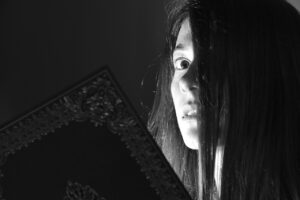There is a portion of scripture found in The Book of Jeremiah that we would do well to consider. It introduces us to two kinds of blindness, the one contrasting with the other at the highest possible level, namely, the blindness of the cursed and the blindness of the blessed. Here is the passage:
Thus saith the Lord; Cursed be the man that trusteth in man, and maketh flesh his arm, and whose heart departeth from the Lord. 6 For he shall be like the heath in the desert, and shall not see when good cometh; but shall inhabit the parched places in the wilderness, in a salt land and not inhabited. 7 Blessed is the man that trusteth in the Lord, and whose hope the Lord is. 8 For he shall be as a tree planted by the waters, and that spreadeth out her roots by the river, and shall not see when heat cometh, but her leaf shall be green; and shall not be careful in the year of drought, neither shall cease from yielding fruit” (Jeremiah 17:5–8).
(I am quoting from the King James because in both verses, i.e., verse six and eight, it uses the word “see” to translate the Hebrew word רָאָה as do the Targum and the Qere.)
The cause of the polarity
As these three verses testify, the two representatives are diametrically opposed and their polarization has been engendered by a specific choice. A person could hardly expect the cause of the disparity to be what it is, for it has to do with whom a person trusts. So on one side we have the cursed man trusting in man, which leads him to make flesh his arm; and on the other side the blessed man trusting in the Lord, which leads him to hope in Him. It follows that the contradistinction between these two people resides in the object of their confidence.
The contrast
At the end of the day we are left with a disparateness as impressive as the one between life and death. The one is like the heath in the desert, inhabiting the parched places in the wilderness. The other as a tree planted by the waters, fruitful in all seasons. The only thing that seems to unite them is the fact that both are blind. But here again, as we are about to see, the nature of their blindness makes them absolutely antithetical.
The blindness of the cursed
We are told that the man who has inflicted a curse upon himself shall not see when good cometh. Nowhere does it say good will not come, but the tragedy resides in the fact that although good will come he will not see it, i.e., he will not experience it, neither will he benefit from it, nor will he know it has been there in the first place.
What a position! Such a person is doomed from the very start. If, on a rainy day, you offer him an umbrella he will complain because the umbrella is black. If you offer him a rose he will be annoyed because it has thorns. If you invite him to the restaurant he will grumble because the food is too salty. And if you offer him your help he will protest saying he can do it as good as you. And there goes the manifestation of the curse, intertwined in the warp and woof of his very consciousness.
Some of these people go from church to church, frustrated and unhappy. They manage to find something wrong everywhere, with nearly everything, and with almost everyone. It seems they have lost the ability to perceive any good. What a pathetic state of affairs! Immersed in blessings, yet affected by none of them; experiencing all the while the pain caused by the broken reed piercing their hand. I am referring here to 2 Kings 18:21 where we read:
Now look! You are trusting in the staff of this broken reed, Egypt, on which if a man leans, it will go into his hand and pierce it. So is Pharaoh king of Egypt to all who trust in him.”
Trusting in the arm of flesh might bring a momentary relieve, but on long term it will always give rise to problems and discontentment, for it brings rottenness to the soul and aggravation to the spirit.
The blindness of the blessed
Standing poles apart is the blessed man of whom it is said, he shall not see when heat cometh. Again it does not say heat will not come, but the one trusting in the Lord will not experience it for what it is. In other words, it will not affect him negatively.
Here the word “heat” stands for such adversities as hardships, calamities, tribulations, or afflictions. Now, as much as the cursed man cannot experience the positive effects of consolation, the blessed man cannot experience the negative effects of affliction. In fact he goes even further, he actually experiences its blessing. The apostle Paul was such a man. Here is what he writes:
For our light affliction, which is but for a moment, is working for us a far more exceeding and eternal weight of glory” (2 Corinthians 4:17).
This sort of understanding should not surprise us; it is a natural side effect of trusting God.
And we know that all things work together for good to those who love God, to those who are the called according to His purpose” (Rom. 8:28).
So here we have it. For the blessed person everything is for good. Therefore he glories in tribulation (Rom. 5:3) and remains exceedingly joyful in it (2 Cor. 7:4). He sings in prison (Acts 16:25), blesses those who curse him (Matt. 5:44), does good to those who hate him (Matt. 5:44), and the list goes on and on.
Conclusion
So where do I stand in all this? Which character resembles me the most? May God help us to answer these questions with integrity of heart, for at the end of the day only honest answers will make a difference.
If you think this post can help somebody you can share it with the options presented bellow.













